MODELING DECIMAL MULTIPLICATION
Example 1 :
Multiply 0.3 and 0.5.
Solution :
To multiply 0.3 and 0.5, let us consider decimal grids given below.
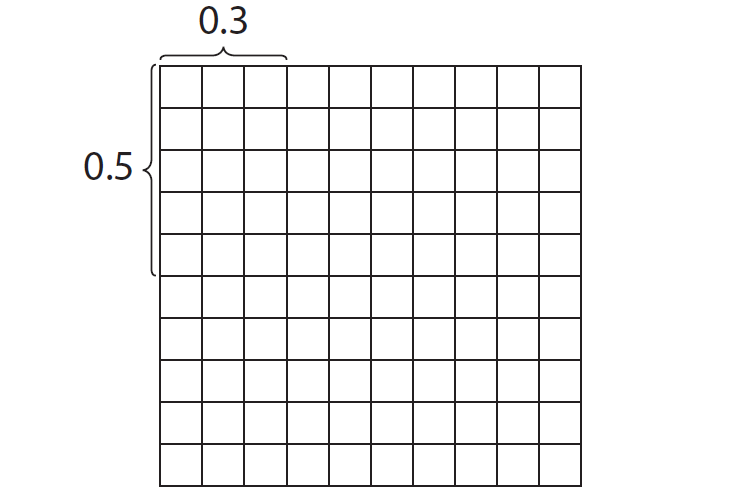
0.3 × 0.5 represents 0.3 of 0.5.
Shade 5 rows of the decimal grid in green color to represent 0.5.
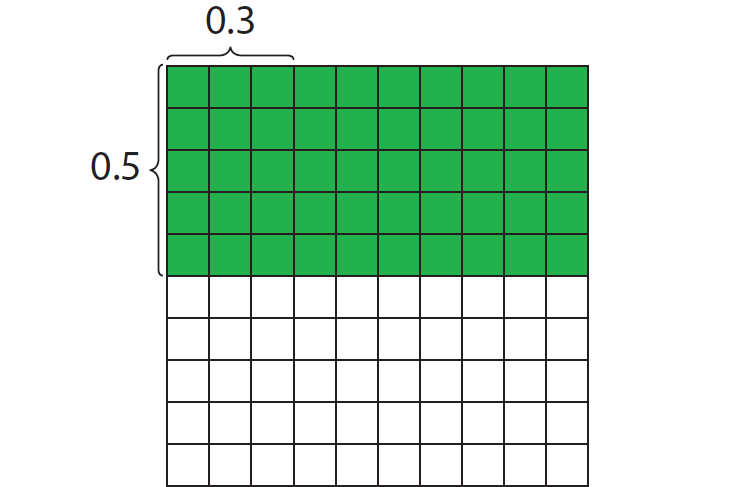
Shade 3 columns of the decimal grid in red color to represent 0.3.
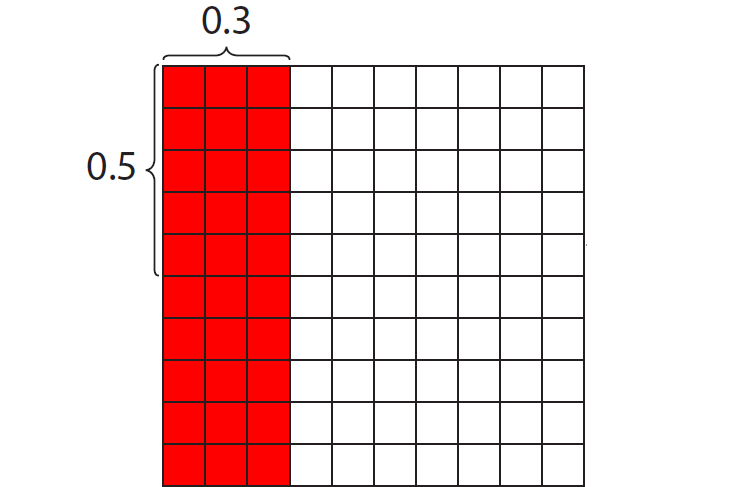
Now shade the common region of 0.5 and 0.3 in blue color.
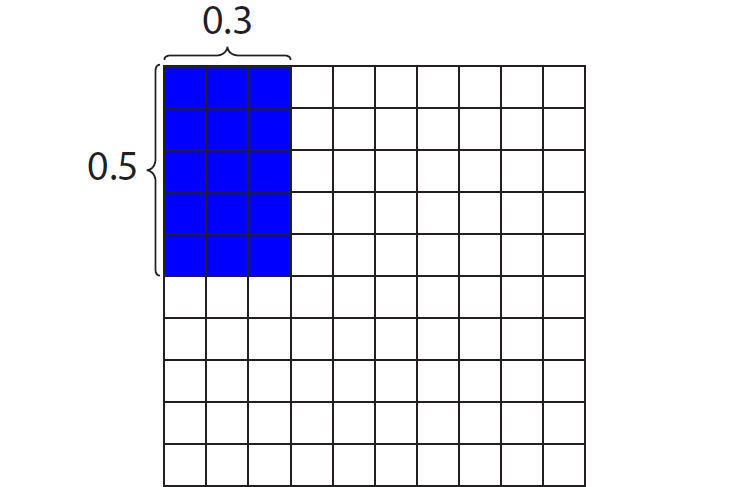
In the common region of 0.5 and 0.3 in blue color, there are 15 squares.
This represents 15 hundredths or 0.15.
Therefore, 0.3 x 0.5 = 0.15.
Example 2 :
Multiply 3.2 and 2.1.
Solution :
Let us use area model to multiply 3.2 and 2.1.
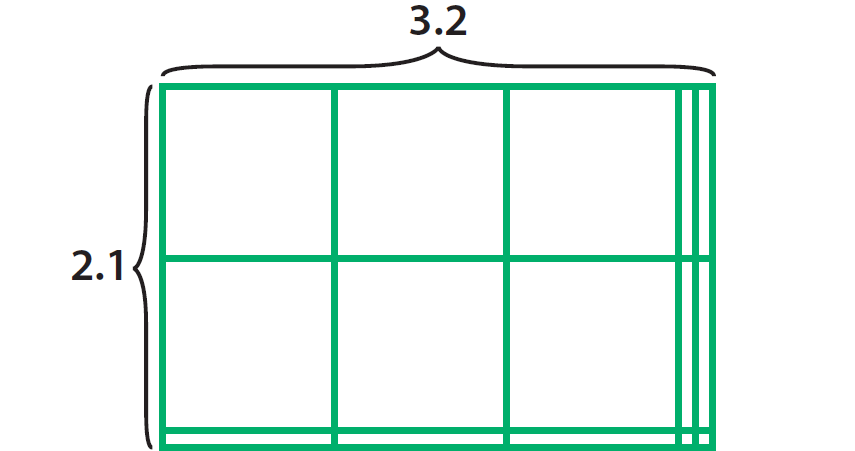
In this model, the large squares represent wholes, the small rectangles along the right and lower edges represent tenths, and the small squares at the lower right represent hundredths.
This model is 3 and 2 tenths units long, and 2 and 1 tenth units wide.
The area of the model is
6 wholes + 7 tenths + 2 hundredths sq. units
Therefore, 3.2 x 2.1 = 6.72.
Solved Problems
Problem 1 :
Multiply 2.3 and 1.78.
Solution :
Imagine the given decimals as whole numbers.
Then, we have 23 and 178.
Now, multiply 23 and 178.
23 x 178 = 4094
In the first decimal 2.3, there is one digit after the decimal point and in 1.78, there are two digits after the decimal point.
So, we have
1 + 2 = 3
In the above result 4094, there must be 3 digits after the decimal.
Hence, 2.3 x 1.78 = 4.094.
Problem 2 :
The side of a square is 3.2 cm. Find its perimeter.
Solution :
All the sides of a square are equal.
Length of each side = 3.2 cm.
Perimeter of a square = 4 x side
Thus, perimeter = 4 x 3.2 = 12.8 cm.
Problem 3 :
The length of a rectangle is 6.3 cm and its width is 3.2 cm. What is the area of the rectangle?
Solution :
Formula for area of rectangle :
= length x width
Substitute length = 6.3 cm and width = 3.2 cm.
= 6.3 cm x 3.2 cm
= 20.16 cm2
Problem 4 :
Multiply 3.723 by 100.
Solution :
We multiply by 3.723 by 100. So, we have to move the decimal point two digits to the right.
3.723 x 100 = 372.3
Problem 5 :
Multiply 3.723 by 1000.
Solution :
We multiply by 3.723 by 1000. So, we have to move the decimal point two digits to the right.
3.723 x 1000 = 3723
Problem 6 :
The price of a fruit is $3.52 per lb. Find the cost of 10 lbs. of fruits.
Solution :
Given : Cost of 1 lb. of fruit = $3.52.
Then, the cost of 10 lbs. of fruits is
= 10 x 3.52
We multiply by 3.52 by 10. So, we have to move the decimal point one digit to the right.
= 35.2
Hence, the cost of 10 lbs. of fruits is $35.2.
Problem 7 :
A person walks regularly in the morning. If the speed of his walking is 43.26 ft. per minute, Find the distance covered by him in 100 minutes.
Solution :
Given : Speed is 43.26 ft. per minute.
So, distance covered in one minute is 43.26 ft.
We all know the formula for distance.
Distance = Speed x Time
Substitute time = 100 and speed = 43.26.
Distance = 43.26 x 100
We multiply by 43.26 by 100. So, we have to move the decimal point two digits to the right.
Distance = 4326 ft.
Problem 8 :
One-thousandth of a certain number is 0.003. What is the number?
Solution :
Given : One-thousandth of a certain number is 0.003.
Let 'a' be the number.
Then, from the given information, we get
(1/1000) x a = 0.003
Multiplying by 1000 on both sides, we get
a = 0.003 x 1000
We multiply by 0.003 by 1000. So, we have to move the decimal point three digits to the right.
a = 3
Hence, the the number is 3.
Kindly mail your feedback to v4formath@gmail.com
We always appreciate your feedback.
©All rights reserved. onlinemath4all.com
Recent Articles
-
Digital SAT Math Problems and Solutions (Part - 150)
Apr 25, 25 11:46 AM
Digital SAT Math Problems and Solutions (Part - 150) -
AP Calculus AB Problems with Solutions (Part - 19)
Apr 24, 25 11:10 PM
AP Calculus AB Problems with Solutions (Part - 19) -
AP Calculus AB Problems with Solutions (Part - 18)
Apr 24, 25 11:06 PM
AP Calculus AB Problems with Solutions (Part - 18)
